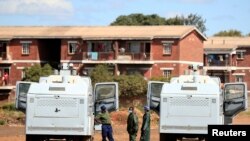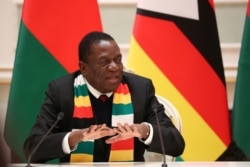Zimbabwe on Saturday marked the 40th anniversary of its independence from Britain, but unlike years past, there were no celebrations. Zimbabwe is on lockdown and battling the spread of COVID-19 amid shortages of resources.
Some citizens say that even if there were no coronavirus pandemic, they would be in no mood to party. Their reasons vary.
President Emmerson Mnangagwa delivered a televised address Saturday from the State House instead of the traditional way – in person in a football stadium.
“This year, we had planned to celebrate this grand occasion, in Bulawayo province," he said. "However, the reality of the COVID-19 pandemic is seeing us endure a necessary lockdown in our homes. Although we are physically separated, we are united in spirit.
"The time to celebrate together shall come. … Today, our task, in relation to COVID-19, is to stay at home, keep our distance and wash our hands. We celebrate our milestone 40th independence anniversary in the context of unprecedented times, that of the threat brought about by the COVID-19 pandemic.”
Uncertainty
To date, Zimbabwe has recorded 24 cases and three deaths. Some citizens, like computer science student Raphael Maramba, 23, say the pandemic has led to uncertainty about the future.
“I am feeling independent but just stressed over the corona[virus] thing," he said. "We do know what happens after Independence [Day]. We will go back to school or lockdown extension. If there was no corona[virus] I would be happy. This corona[virus] thing is affecting my studies. If I do not go back to school this year, it means I will have a year extension. So, it will not [be] good for me.”
A 33-year-old woman who wished to be identified only as Rutendo cited financial challenges and a lack of upward mobility for not wanting to celebrate the anniversary.
“Personally, I am not independent and I am not happy, because it has been a struggle since my adulthood until now," she said. "We talk about financial freedom, but it is happening to a few elite. Most of us are still struggling. So, independence is just a word. If you are not connected, then you continue with the struggle. Hard work does not matter if you are not connected.”
Mnangagwa took power in November 2017, succeeding the late, long-serving leader Robert Mugabe. Mnangagwa promised to address corruption, human rights abuses and economic problems that his predecessor had been accused of ignoring. Some critics say Mnangagwa has failed to deliver on his promises.
Tabani Moyo, head of the Media Institute of Southern Africa in Zimbabwe, says the Mnangagwa government, like the previous one, has not respected press freedoms.
Too much 'entitlement'
“We have gone for a good decade without alternative means of expression," Moyo said. "Even if there was no lockdown, chances are that we were going to be mourning as we commemorate this day. Unfortunately, and sadly, there is too much level of entitlement among the generation that brought independence. That sense of entitlement erodes the cornerstones of the freedom of expression and access to information that the country yearns for.”
Ahead of the anniversary, police told the High Court that the state broadcaster was the only news medium to be considered an essential service during the lockdown, which ends Sunday after 21 days.





